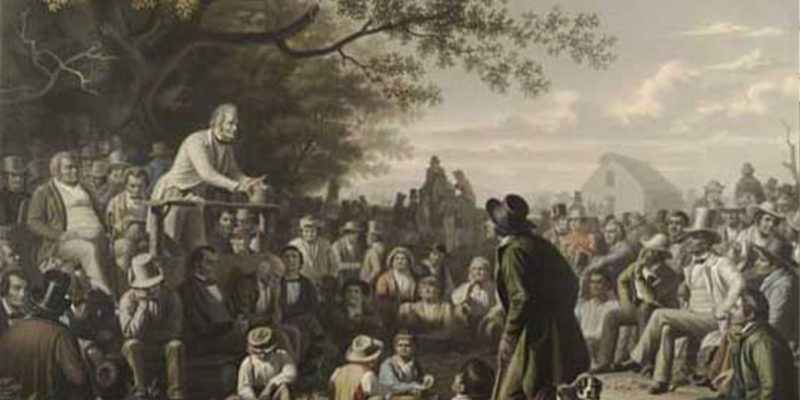Alexander Hamilton’s underlying arguments in The Federalist Papers and the Pacificus-Helvidius Debates of 1793-1794 expand the power of the presidency and display Hamilton’s desire for a king-like president of the United States, much like Great Britain’s monarch.
During the Constitutional Convention, Hamilton introduced his own plan of government on June 18, 1787, which he acknowledged could be compared to an elective monarchy (Madison 2014, 99). There is speculation Hamilton introduced his radical plan to make Madison’s plan look more moderate by comparison, allowing its passage, but his writings tell a different story. From his writings in The Federalist Papers and in the Pacificus-Helvidius Debates, it is clear Hamilton never gave up hope on having a king-like president for life in the United States similar to Great Britain’s monarch.
Hamilton’s plan allows a president to serve indefinitely with good behavior, with powers to veto any law; execute laws; grant pardons; direct war once Senate authorizes or begins one; appoint chief officers of Finance, War, and Foreign Affairs; and appoint all other officers, pardon treason, and make treaties with the approbation of the Senate. The plan also allows for the impeachment of the executive and establishes national supremacy over the states (Madison 2014, 100-101). Hamilton offers much praise of the British form of government in his discussion and defends his desire for a president for life by pointing to the success of the hereditary monarch in Britain. There, he argues, the monarch’s personal interest and the self-preservation in the country coincide and influence by foreign powers is unlikely (Madison 2014, 97-99).
Hamilton was displeased with certain aspects of the Constitution when the Convention adjourned but argued in favor of it in The Federalist Papers under the pen name Publius, at times directly contradicting the ideas he argued for in the Constitutional Convention. Hamilton promised in Federalist 1 to take his own motivations out of his writing, but he was unable to uphold this. Hamilton wrote all the Federalist essays pertaining to the presidency, showing how important it was to him that his interpretation be accepted as the correct interpretation. Hamilton was in favor of a strong presidency, stating in Federalist 70 that “a feeble Executive implies a feeble execution of the government.” He goes on: “A feeble execution is but another phrase for a bad execution; and a government ill executed, whatever it may be in theory, must be, in practice, a bad government.” In Federalist 69, Hamilton attempts to distract the people from the similarities between the American president and British monarch by overwhelming them with numerous minor differences. Hamilton’s obsession with proving the presidency different from the monarchy only serves to show how similar they are. He highlights that the president can veto laws only subject to Senate approval; cannot grant pardons in cases of impeachment; requires Senate approval to make treaties; and while he commands the army, navy and militia, he cannot declare war or raise troops. It is true the president has short terms and can be impeached, unlike the British monarch, but Hamilton continually points out the shortcomings of such terms, betraying his true desire to have a president for life.
Hamilton comes back to the issue of term limits throughout The Federalist Papers. Notably, in Federalist 71, Hamilton argues for a four-year term for the president, but, again, what shines through is his desire to have a president for life. He begins by discussing the importance of a longer term to give the executive motivation to care about the position and do things of consequence (Federalist 71). According to Hamilton, another key benefit of a longer term is stability in the administration of the United States (Federalist 71). Hamilton seems to merely settle for four-year terms, as he has only negative things to say about power changing hands and reigns ending.
Hamilton later argues re-eligibility of the president is necessary to give the executive incentive to act well, as the people have the power to elect a new president if they are not satisfied with the incumbent’s performance (Federalist 72). Negative consequences of excluding presidents from reelection are: decreased motivation to act well, temptation to take advantage of his power without career consequences, depriving the nation of an experienced president, removing people from office in emergencies to the detriment of public safety, and forced instability of government administration (Federalist 72). Hamilton briefly mentions a concern that if presidents are not eligible for reelection there would be past presidents “wandering among the people like discontented ghosts, and sighing for a place which they were destined never more to possess,” jeopardizing the stability of government (Federalist 72). His emphasis on these negative aspects of frequent elections highlights his desire for longer terms or life terms, plainly dissatisfied with the four-year term limit.
Hamilton defends qualified veto power in Federalist 69 despite his own desire for the president to have an absolute veto like the British monarch, as announced in his plan at the Constitutional Convention (Madison 2014, 100). Hamilton attributes the growing disuse of the absolute veto in Great Britain to the immense influence the monarch has over Parliament to prevent passage of laws the monarch would want to veto (Federalist 69). This influence is used to avoid blatantly exerting power over Parliament and losing public favor. Hamilton echoes this idea in Federalist 73, arguing that the monarch’s caution in using vetoes meant the president would be even more cautious, because presidents must maintain the favor of the people to be reelected. What Hamilton doesn’t consider is the monarchy’s struggle to maintain power without reelections to garner support and reaffirm power. The monarchy is better off leaving divisive issues to Parliament to avoid spurring revolution to put a new monarch in power or to abolish the monarchy altogether.
Hamilton addressed treaty power several times throughout The Federalist Papers and later in the Pacificus-Helvidius Debates. Hamilton firmly believed there was no comparison between the proposed presidential power and the actual power of the British monarch regarding treaties, because the British monarch could represent Great Britain and make treaties without permission from anyone else (Federalist 69). This seems overly optimistic on Hamilton’s part, as the president still gets to negotiate on behalf of the United States and the Senate only gets to work with what the president gives them, like Parliament in Britain. It is true the British monarch has more freedom, but the difference is not as large as Hamilton portrays it to be. In Federalist 75, Hamilton asserts it is irresponsible to give complete treaty-making power to a short-term president, in comparison to the monarch of Great Britain, and therefore there must be Senate approval. A hereditary monarch has too much personal stake in the wellbeing of the government to be dangerous, while the president will soon return to being a private citizen, making them more apt to serve their own interests rather than the interests of the people (Federalist 75). Hamilton here in Federalist 75 presents an underlying argument for a president for life to remove the drawbacks of presidents who know they cannot rule forever.
The Pacificus-Helvidius Debates of 1793-1794 started as Hamilton’s defense of Washington’s Neutrality Proclamation in response to the conflict between France and the rest of Europe, most importantly Great Britain, but evolved into much more. Hamilton wrote under the pseudonym Pacificus. Hamilton maintains Washington was reminding the citizens of the United States of the consequences of breaking neutrality and potentially dragging the United States into a war when he made the Neutrality Proclamation, therefore doing his job of enforcing the laws (Pacificus I). However, Hamilton also defends Washington’s proclamation by establishing a loose interpretation of the powers granted to the executive branch and thus expanding the powers of the executive.
Hamilton’s loose interpretation of the executive power is largely based on his belief the first sentence of Article II of the Constitution – “The executive Power shall be vested in a President of the United States of America” – is a general grant of executive power, and the list of powers in the next section are merely examples, not limitations (Pacificus I). He supports this claim in the first Pacificus essay by pointing to the different method of granting powers to the legislative branch, the Constitution stating in Article I: “All legislative Powers herein granted shall be vested in a Congress of the United States, which shall consist of a Senate and House of Representatives.” Hamilton argues this difference implies the legislative branch is limited to the powers granted to it by the Constitution, while the executive branch includes more (Pacificus I). He views clauses referring to cooperation with the Senate, such as in appointment of officers or the making of treaties, as stipulations to the executive powers (Pacificus I). Another such stipulation is that the legislature has the right to declare war and grant letters of marque and reprisal (Pacificus I). Hamilton interprets the Constitution to expand executive power to include the right to judge whether new foreign rulers should be recognized. This power also includes the right to decide whether the United States will adhere to any previous treaties with said foreign country, a power similarly held by the British monarch.
Hamilton also expresses the right of the president to determine the condition of the nation in Pacificus I; the president can enforce laws in a way that seems to fit the condition of the nation, establishing an antecedent state of things the legislature should take into consideration in their decisions. Hamilton reiterates: if the legislature has the power to declare war and has not declared it yet, it is the responsibility of the executive to maintain peace unless and until war is declared (Pacificus I). It is possible this power will impact the power of the legislature to declare war, but Hamilton views their power to declare war as a stipulation to executive power, so the president’s right to enforce laws comes before Congress’s right to declare war (Pacificus I). Hamilton claims Congress is still free to perform its duties and could, in the case of a proclamation such as Washington’s, still declare war, as the president’s only say in the declaration of war is to veto it, but even this can be overruled by the legislature (Pacificus I). It would, however, appear disorganized if the president were to proclaim peace and Congress subsequently declared war, making the notion unrealistic. These Pacificus-Helvidius Debates were important in their interpretation of the powers of the executive branch, as they came early in the life of the Constitution and helped to explain the ideas behind the founding, at least of the men who wrote them. Hamilton’s ideas about a powerful presidency resembling the British monarchy shine through in all his Constitutional writings. Hamilton knew the power his writings in The Federalist Papers and the Pacificus-Helvidius Debates could have and took advantage of this opportunity to push his own personal agenda for a powerful, expanded presidency resembling the British monarchy.
References
Hamilton, Alexander and James Madison. 2007. The Pacificus-Helvidius Debates of 1793-1794: Toward the Completion of the American Founding. Edited and with introduction by Morton Frisch. Indianapolis IN: Liberty Fund. http://oll.libertyfund.org/titles/hamilton-the-pacificus-helvidius-debates-of-1793-1794
Madison, James. 2014. Debates in the Federal Convention of 1787. Edited by Gordon Lloyd, Ashbrook Center at Ashland University.
Publius. The Federalist Papers. http://www.foundingfathers.info/federalistpapers/hamilton.htm




 Compass is an online journal that provides a space for the work of talented undergraduates who have original and well-articulated insights on important ideas and issues relating to American democracy understood in the broad contexts of political philosophy, history, literature, economics, and culture.
Compass is an online journal that provides a space for the work of talented undergraduates who have original and well-articulated insights on important ideas and issues relating to American democracy understood in the broad contexts of political philosophy, history, literature, economics, and culture.